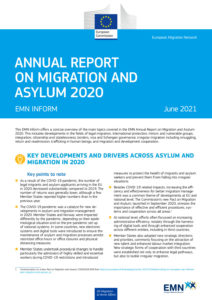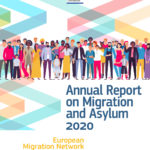The year 2020 brought about unforeseen developments in the areas of migration and asylum. The COVID-19 pandemic impacted the number of migrants, asylum applicants and returns, and also acted as a catalyst for development of new digital solutions in asylum and migration management. These new challenges came in addition to persisting ones such as the need to continuously improve migration management systems and ensure the protection of refugees. The Annual Report on Migration and Asylum, published by the European Migration Network (EMN), provides an overview of the key developments in the EU Member States and Norway in 2020.
In 2020, COVID-19 related travel restrictions resulted in a significant decrease in the numbers of third-country nationals entering the EU, either as legal migrants or as asylum seekers, and those leaving the EU in the framework of return procedures. Preliminary data indicates that the number of visa and residence permits issued in 2020 decreased by nearly 50% in some Member States, and the number of asylum applications decreased by 32.6% compared to the previous year.
Electronic systems and digital tools played a key role in maintaining the functioning of migration and asylum systems amidst restricted access to offices and physical distancing measures. Member States which did not have such services in place initially, rapidly introduced mail, online, or other electronic services for application and renewal of visas and residence permits. Measures were also put in place to protect the health of migrants and asylum seekers, and to prevent them from falling into irregular situations. A key priority among some Member States was to facilitate the admission of essential workers.
Besides COVID-19 related developments, increasing the efficiency and effectiveness for better migration management was a common theme at EU and national level. The European Commission’s new Pact on Migration and Asylum laid out a comprehensive approach in the areas of migration, asylum, integration and border management. It also highlighted the importance of better processes and systems and the importance of increased coordination. Member States adopted new strategic directions and priorities, as well, focusing for example, on the attraction of new talent and labour market integration. New forms of cooperation with third countries were established both at EU and national level, not only to prevent irregular migration, but also in the area of skilled migration.
The protection of asylum seekers and refugees, including minors and other vulnerable groups, remained an area of legislative and policy development at EU and national level during 2020. The devastating fire in the Moria camp in Lesbos, Greece in September 2020 brought the topic of the reception of asylum seekers into the spotlight, with several Member States reacting through relocation pledges.


